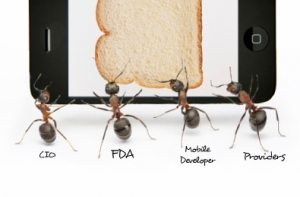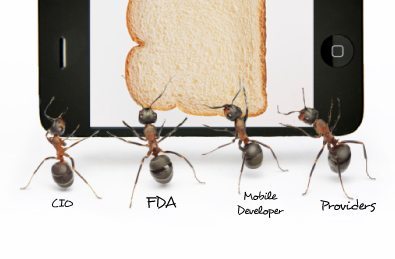(continued from mHealth Landscape for 2012 part 1)
The Provider
While it may be a mobile application developer’s dream to stay “connected”, this isn’t necessarily the goal of many physicians. They like being disconnected for a time rather than easily accessible to their patients through emails or texts or some new mHealth app that increases “touch”. More accessibility might translate into more work for the physician with little to no incentive for packing on a larger work load. You could see how this might be a hard sell to a provider. Providers are likely to want applications implemented into their current workflow rather than be another disruptive innnovation.
The Hospital
Let’s consider a hospital’s view of mHealth. That’s right we mean money or reimbursement. Try convincing a hospital’s CEO that keeping people out of their hospital is a good thing. Currently mHealth supports the ACO model over the Fee-for-Service model because wellness apps are developed with the idea of keeping people out of the hospital.
The IT Department
What about the IT Department within an organization? You know those poor souls who pretty much have the entire weight of making all this work from multiple devices that are in multiple places. In the old days it might have been easy for them to say everyone has to use a Blackberry. Now such a demand might move your employees into an “Occupy IT” protest. They have to ask the questions that no one wants to hear such as, “What happens if your device with all that patient information is stolen?”. These small mobile devices are inconspicuous and easier to steal or lose than more traditional devices.
Like telehealth, adoption of mHealth within an organization takes developing the right relationships, convincing the right people, and admission that the feds aren’t going away.
See My Notes Below….
 Partnerships will help drive adoption in the mHealth domain
Partnerships will help drive adoption in the mHealth domain
• Mobile Operators/Healthcare Organizations
• Mobile Developers/Application Vendors/Healthcare Organizations
• OEMs/Healthcare platforms or Application Vendors
• Multi-value chain partnerships
Many small practice physicians and rural practices tend to be either….
- Comfortable with existing practices
- Don’t use mobile/social devices and services in daily life
- Struggling to keep educated as new technologies are available
- Under-staffed to make a shift to mHealth
- Under-Capitalized to make the mHealth investment
- Embrace and use mobility in daily life
- Are social networkers
- Are members of Gen-X and Gen-Y and have used PC’s all their life
- Are confused on best practices
- Are part of hospital or provider networks who must increase productivity to remain financially viable
What are some other challenges to mhealth adoption?
• It’s early so new business models are still being developed
• Standards for collection of data need to be formalized
• Training around new devices, services, processes and procedures is required
• Consolidation of practices and clinics is occurring
• The regulatory environment is still in question and is always changing
• Best practices around security of information & compliance with regulation are still being developed
• Developing a core infrastructure is costly
• Security is always a concern
• FTE support for mobile devices in hospital helps desks
• Integration of multiple devices to send information to a common platform
 Want to make an app for your organization? Prepare before taking it to your CIO.
Want to make an app for your organization? Prepare before taking it to your CIO.
- Have a strong use case
- Detailed technical information about security
- Reassurance about not compromising patient information PHI
- Reassurance about lack of impact or compromise on the clinical systems
Regardless of the provider’s perceptions or the challenges involved, there seems to be some agreement that mHealth has the potential to change the healthcare landscape. As more people use mobile devices, new patient expectations for mobile access to healthcare will drive adoption.
I’ll continue to bring more notes to you as I work my way through the huge catalog of presentations. So look back here for more soon….
Notes from the following mHealth Summit 2011 presentations: Business Model Challenges for Deployment of mHealth Solutions and Practical Policy and Business Implications of Implementing Mobile Health Solutions Across the BioMedical Domain.





